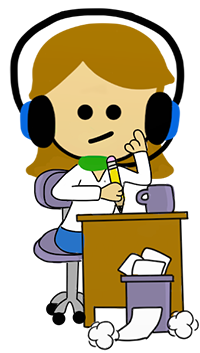Learn English Faster!
22 April 2014 by Diane
Check out Teacher Diane’s latest blog post on Learn English Live!
http://learnoutlive.com/24-techniques-learn-english-faster-according-learning-style/
Wish Statements
20 April 2014 by Diane
Wishes about the present and future
We use wish + past simple to express that we want a situation in the present (or future) to be different.
- I wish I spoke Italian. (I don't speak Italian.)
- I wish I had a big car. (I don't have a big car.)
- I wish I *were a superhero!
* Notice we use “I were” for statements that are impossible or very unlikely.
We use wish + past continuous to express that we want to be doing a different action in the present (or future).
- I wish I was lying on a beach now. (I'm sitting in the office.)
- I wish it wasn't raining. (It is raining.)
- I wish you weren't leaving tomorrow. (You are leaving tomorrow.)
Wishes about the past
We use wish + past perfect to express a regret, or that we want a situation in the past to be different.
o I wish I hadn't eaten so much. (I ate a lot.)
o I wish I had studied harder at school. (I was lazy at school.)
Lay or Lie?
18 April 2014 by Diane
Learn about the difference between LAY and LIE with Teacher Diane’s latest video tutorial:
http://www.youtube.com/watch?v=R9IdLeTre3c
LAY (verb): to put down gently or carefully
LAY is a transitive verb, meaning it needs a direct object.
For example, we can say:
I lay the book on my desk.
She lays the dinner on the table.
LIE (verb): to be in or assume a horizontal resting position
LIE is an intransitive verb, meaning it doesn’t need an object.
For example, we can say:
My dog lies in front of me.
I lie in my bed.
Okay, now here’s the hard part...
The past tense of LAY is LIE (this can be confusing!), and the past participle is LAIN.
The past tense of LIE is LAID, and the past participle is LAID.
Present form | Past form | Past participle |
LAY | LIE | LAIN |
LIE | LAID | LAID |
Here are some more examples to help you understand more clearly:
Present: I lie down every day when I get home from work.
Past: Yesterday I lay down and accidentally fell asleep!
Present Perfect: I have lain on a hammock.
Present: He lays all of his documents neatly on his desk.
Past: He accidentally laid an important document in the wrong place.
Past perfect: He has laid a welcome mat outside of the door of his home.
Modals of Deduction
16 April 2014 by Diane
Check out Teacher Diane’s guest post about Modal Verbs of Deduction:
http://wilsworldofwords.com/2014/04/modal-verbs-for-deduction.html
Some vs Any
13 April 2014 by Diane
We use some and any with non-countable nouns and countable nouns (plural)
We use some in positive sentences.
ex. I bought some bread and some eggs at the supermarket. (non-countable and plural countable)
Bread is non-countable. Eggs are countable.
We use any in general questions and negative sentences.
ex. I don’t have any milk in the house. Do you have any children? (General Question)
(Negative sentence)
We use some in questions that are offers or requests (when we want to encourage the listener to say “yes”)
ex. Would you like some more wine? (Offer) Could I have some ice cream? (Request)

